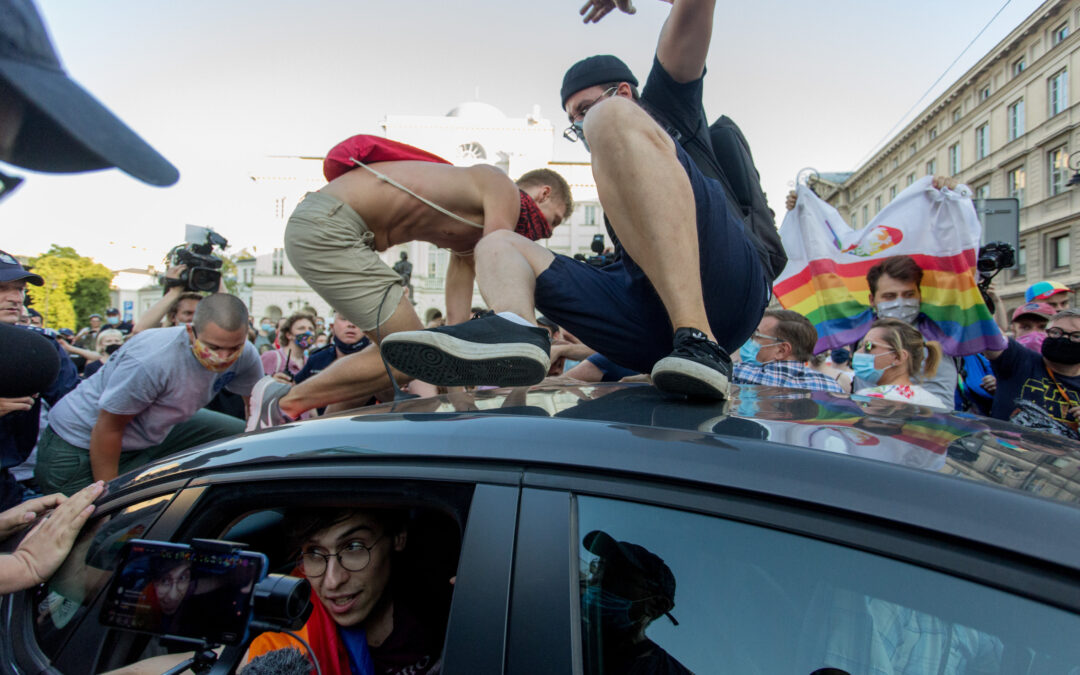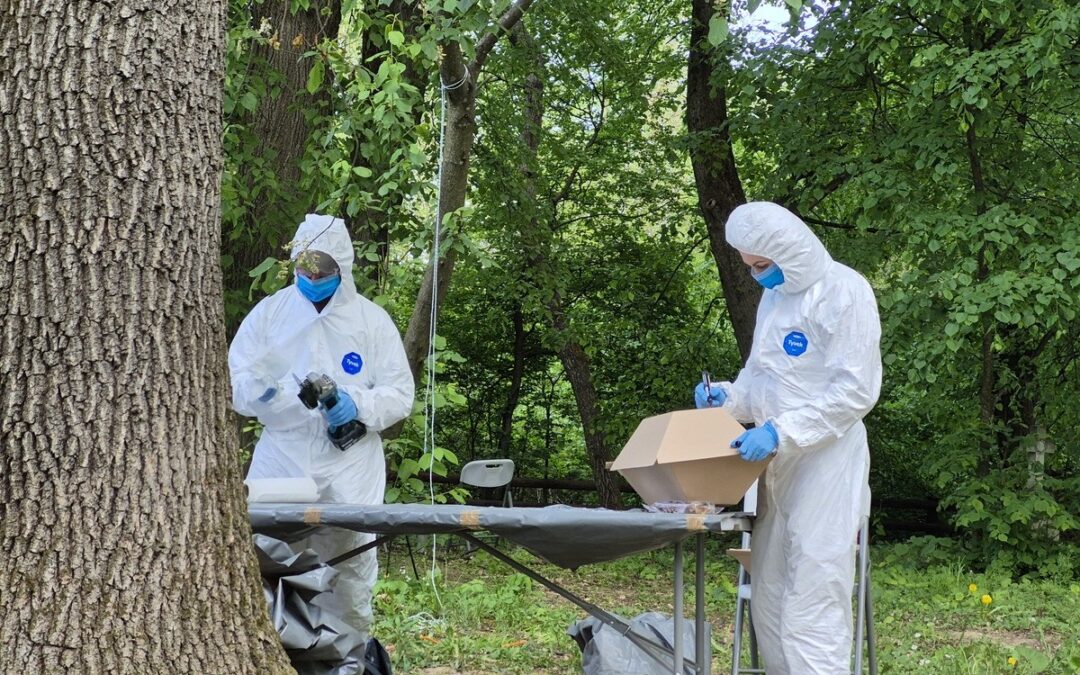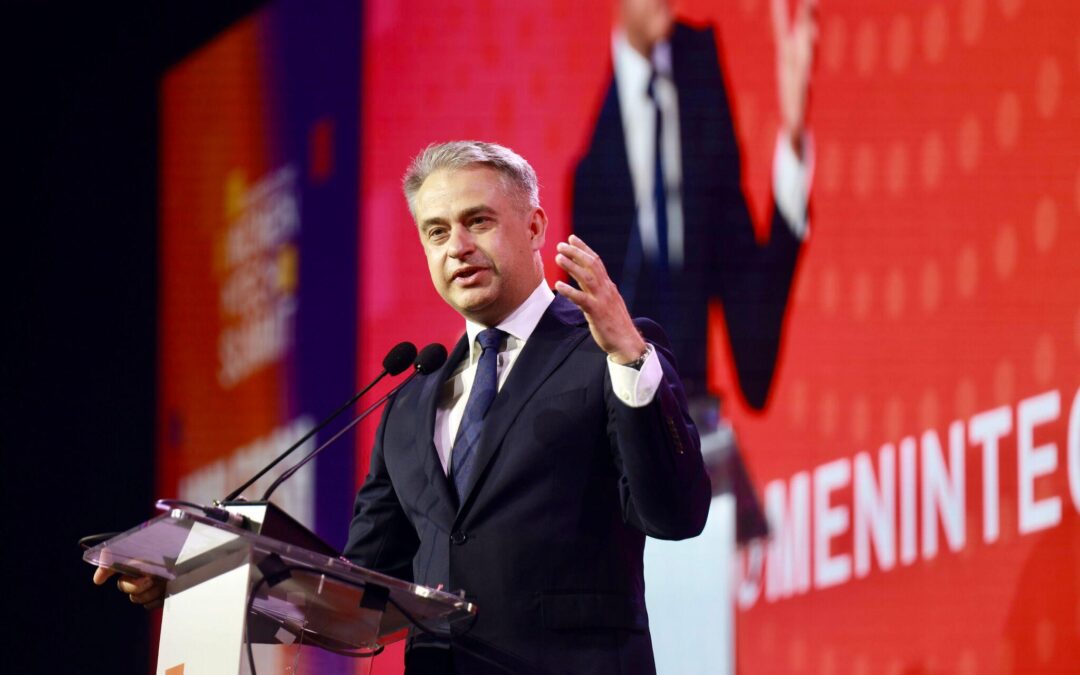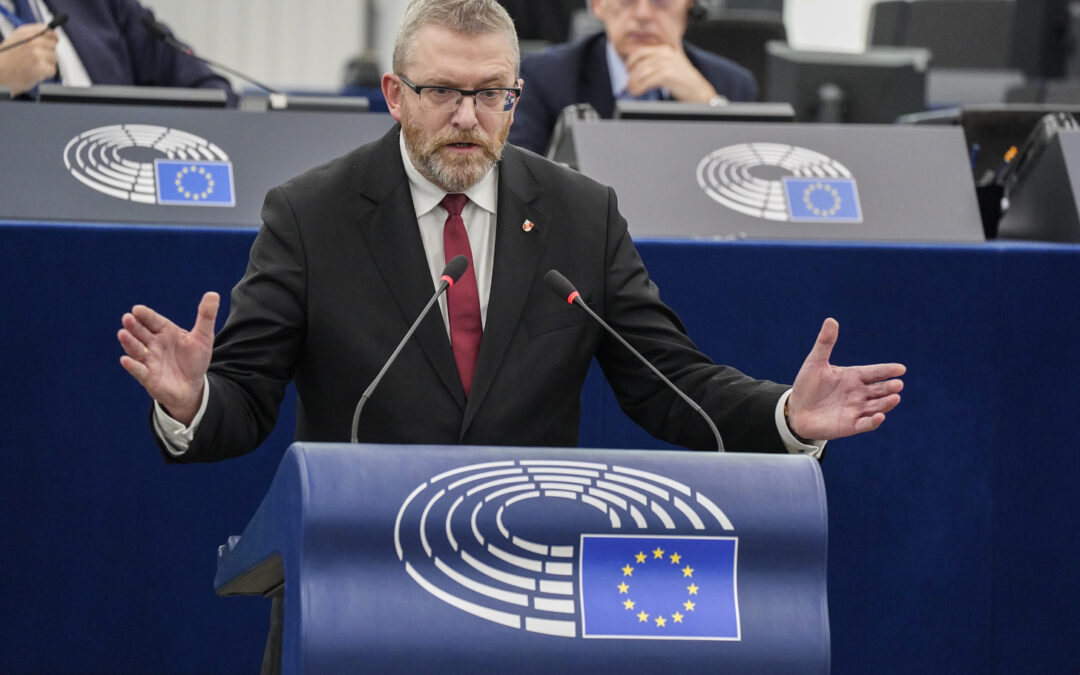By Percy Metcalfe
Over the last 18 months, Poland has witnessed a concerted and vociferous anti-LGBT campaign led by the conservative ruling party, resulting in the country recently being ranked as the worst in the EU for LGBT people.
In response, a new form of activism has arisen: assertive, provocative, aggressive and often illegal. Its proponents argue that, given the current situation, such radicalism is necessary. But others, including some in the LGBT community, worry that it could cause more harm than good.
On 7 August, a court accepted prosecutors’ request for Małgorzata “Margot” Sz. (whose surname is withheld under Polish privacy law) to be held in detention for two months.
The decision sparked a wave of protests in her defence, leading the police to employ force against the demonstrators, 48 of whom were detained and charged.
But critics, including opposition politicians, accuse the police of using excessive force against the protesters https://t.co/vu4m6Li8aB
— Notes from Poland 🇵🇱 (@notesfrompoland) August 8, 2020
The reason for Margot’s detention is an incident in which she is accused of participating in an attack on a van broadcasting anti-LGBT propaganda, which resulted in the vehicle being vandalised and a violent altercation with the driver.
Such vans – which are run by an ultraconservative NGO, Fundacja Pro – have become a common sight on the streets of Polish cities. They display posters and broadcast slogans from speakers that associate homosexuality with paedophilia.
Various legal efforts have been made by LGBT groups to stop the vans, but have largely been unsuccessful, due to the fact that Poland’s laws against hateful and offensive speech do not cover sexual orientation or gender identity.
Although a court in Gdańsk ordered Fundacja Pro to temporarily stop using some of the slogans it claims are based on “scientific” evidence, another judge in Wrocław rejected a case against the organisation, saying that its activities are “informative”.
After the attack on the van, which took place in Warsaw in June, the organisation with which Margot is associated, Stop Bzdurom, posted images from the incident, including one showing their name graffitied on the side of the vehicle.
[SKANDALICZNE ZACHOWANIE 🤡🤡🤡]Furgonetka Fundacji Pro została zatrzymana w trasie, a następnie zniszczona przez grupę…
Opublikowany przez Stop Bzdurom Sobota, 27 czerwca 2020
In a clearly sarcastic tone, Stop Bzdurom condemned the “scandalous behaviour” and said that those involved are “ashamed and sorry”. The group also shared an image of Margot with the stolen number plate of the van, which they said they had “found”.
That incident – and Margot herself – subsequently came to wider attention when, on 14 July, she was detained for the first time by plain clothes police officers, who arrived during the night at an apartment where she had been staying.
There was initially no information released as to where or why Margot was being held. Her arrest – coming two days after the re-election of President Andrzej Duda, who had made anti-LGBT rhetoric part of his campaign – felt like an ominous sign for many members of the LGBT community.
The authorities later revealed that Margot had been detained and charged in relation to the attack on the Fundacja Pro van. Prosecutors attempted to have her retained in custody while the investigation continued, but their request was rejected by a judge and she was released. (That decision was then overturned on appeal last week, leading to Margot being taken back into custody.)
Polish state TV has broadcast further footage of the incident that led to an LGBT activist being detained for two months
A van broadcasting anti-LGBT slogans was vandalised and its driver physically attacked
The activist (wearing glasses) is seen clearly pic.twitter.com/GQE1DLhNr3
— Daniel Tilles (@danieltilles1) August 9, 2020
Soon after Margot’s initial release, Stop Bzdurom and two other groups carried out a further action in which they hung LGBT rainbow flags on famous statues around Warsaw, including one of Christ.
The activists said that their goal was to draw attention to “internalised homophobic attitudes”, as they believe that the rainbow symbol should not in itself offend anyone.
As a result, Margot was detained once more alongside two other activists. All three were charged with insulting monuments and offending religious feelings, both of which are crimes in Poland, the latter carrying a potential prison sentence of up to three years.
“Adapting to the growth of homophobia”
The actions of Margot and the organisations she is associated with, as well as the assertive response of the authorities, mark a further stage in an ongoing escalation of tensions between LGBT groups and the conservative Law and Justice (PiS) government.
This new brand of guerrilla resistance to perceived state aggression has gained some support and sympathy, but also drawn criticism and controversy.
Speaking with Notes from Poland shortly before her latest detention, Margot explained what she calls the groups’ “no apologies” approach. They have sought to “throw off the discourse of docility and shame” that she associates with the respectability politics of more moderate members of the LGBT movement. But this radicalism does not exist in a vacuum; it has “adapted to the growth of homophobia”.
PiS has created an increasingly hostile environment for members of the LGBT community. Last year, around European and local elections, it warned of the dangers of an ill-defined “LGBT ideology” that PiS chairman Jarosław Kaczyński warned was being “imported” into Poland from abroad, “threatening our identity, our nation, [and] its continued existence”.
A large number of local authorities, usually controlled by PiS, passed resolutions declaring themselves “free from LGBT ideology”. The campaign received support from parts of the church, in particular the Archbishop of Kraków, who warned that Poland was facing a “rainbow plague”. He likened “LGBT ideology” to communism and Nazism.
These themes were then revived during the recent presidential election campaign, when incumbent Andrzej Duda, a PiS ally, referred to LGBT as an “ideology of evil” that is “even more dangerous to man that communism”.
It is in this atmosphere of increasing intolerance that groups such as Stop Bzdurom have emerged. Their radicality manifests in the group’s indifference in the face of the law: vandalism and provocation are the principal tools in the guerrilla campaign to promote awareness of their aims. The group’s Instagram page states that spray paint is their weapon, and they are known for graffitiing their own group’s name as part of their actions.
During the recent election campaign, at a time when coronavirus restrictions were meant to limit the size and nature of public events, Stop Bzdurom organised gatherings, including a “rainbow dance party”, outside the presidential palace.
The name of one event was Prowokacja ideologii LGBT (Provocation of LGBT Ideology). Its online description jokingly reminded participants that, as an ideology, they are not subject to legal mandates, clearly referring to the words of President Duda at a campaign event, where he said that “they try to convince us that these are people, but [LGBT] is simply an ideology”.
Stop Bzdurom are not the first activists to fall foul of the law in their response to escalating anti-LGBT sentiment. After filmmaker Bart Staszewski last year attached “LGBT-free Zone” signs outside communities that had passed anti-LGBT resolutions, two MPs from the ruling coalition reported him to prosecutors for violating regulations banning tampering with road signs.
Last month, three activists were indicted for offending religious feelings by adding LGBT rainbow colours to an image of Jesus and the Virgin Mary.
“Bandits and hooligans”
PiS politicians have, unsurprisingly, been quick to condemn the activists involved in such activity. After the hanging of rainbow flags on monuments, Prime Minister Mateusz Morawiecki went to pray beneath the statue of Christ.
He referred to the activists as “aggressors” who had desecrated symbols sacred to millions of Poles. (Stop Bzdurom later stole the candle Morawiecki had left beneath the statue and relocated it to a bridge in Warsaw where a transgender activist committed suicide last year.)
We stole the candle @PremierRP @MorawieckiM and took it to the bridge from which trans activist Milo jumped. Poland is full of transphobic violence – and government is indifferent to it. We did for the cowardly prime minister what he should have done himself. #stopbzdurom #lgbtq pic.twitter.com/U6gyhTYNNf
— Stop Bzdurom (@stopbzdurom) August 2, 2020
The justice minister, Zbigniew Ziobro, described the activists as “bandits and hooligans”. Earlier this year, his ministry began funding a project on “counteracting crimes…committed under the influence of LGBT ideology”.
Among the political opposition, responses have varied. Left-wing MPs have been openly supportive of the activists, joining protests, visiting them in detention and condemning the actions of the authorities. Some even blocked a police van taking detained protesters to an unknown destination.
Wywożą ludzi z komisariatu na Zakroczymskiej, mimo że jest tutaj pełnomocnik i nie odmawiano nam informacji, dokąd przewożą manifestujących. Musiałyśmy z @B_Maciejewska zablokować wyjazd, żeby nam powiedzieli, gdzie wywożą tych ludzi pic.twitter.com/GEv8PmSIfJ
— Magda Biejat (@MagdaBiejat) August 7, 2020
Others, including the more centrist main opposition party, Civic Platform (PO), are more circumspect. They have often expressed disapproval of the activists’ actions (and concern that they play into PiS’s hands) alongside sympathy with their cause and strong condemnation of the response of the authorities.
Rafał Trzaskowski, the PO mayor of Warsaw, referred to the flag hanging as an “unnecessary provocation”, but also criticised police and prosecutors for their heavy-handed response.
Following Margot’s two-month detention, Trzaskowski went further, accusing the government of “cynically trying to inflame the situation, to divide and incite us”. He likened their methods to those of the communist-era authorities and also expressed sympathy for Margot, calling her actions “an expression of helplessness” in response to “acts of hate” against LGBT people.
With us or against us
Even among Poland’s LGBT community, not all have been enthusiastic about Stop Bzdurom’s methods. In the wake of the flag-hanging incident, liberal news website NaTemat interviewed five LGBT people who felt uneasy about the provocation.
For some, the insult to religious feeling was a step too far; others questioned the wisdom of strategies that make LGBT people standout, preferring campaigns that present them as “normal people”. One interviewee said they should be looking for issues that they have in common with religion, such as the idea of love.
Margot herself acknowledges that Stop Bzdurom and other radical LGBT groups do not play by the same rules as more traditional organisations working towards the same broad goal.
“The NGOs operate within the legal system,” she says. “They are able to raise large sums of money for positive image campaigns.” She sums up their attitude as: “if we are nice people, then we will get rights.” However, in doing so, they risk very little and leave the discussion of LGBT rights feeling like “academic discourse”.
By contrast, her group’s aim is to “demand that people take a clear stand”, she says, adding that only “false allies lament over our actions being ‘too much’”. Only through provocative action, she argues, can the LGBT community really know who is there to help and who “would rather silence us and watch us die quietly”.
We're doing great! Thank you for great support and solidarity. /// Do you think sleeping at the police station will break us? LOL We had a great vacation. We recommend prison libraries (the worst in the world!)
GTFO @PolskaPolicja you're getting creepy. 🤮 #stopbzdurom pic.twitter.com/H6trtX0QoS
— Stop Bzdurom (@stopbzdurom) August 6, 2020
In general, however, the main organisations in Poland’s LGBT movement have expressed support for the newly emerged radical fringe of their push for equality. Speaking to Notes from Poland, Julia Maciocha, the head of the foundation that organises the annual LGBT Equality Parade in Warsaw, expressed disappointment that some in the community chose to criticise the protests.
“Every LGBTQ organisation in Poland has their own specifics and are occupying one path,” she says, and Stop Bzdurom is filling a necessary niche in the landscape of LGBT activism. “It is a signal that our movement is in a very good state right now,” she adds, explaining that similar radical movements emerged in many European countries that went on to adopt equal rights.
Another leading LGBT group, Kampania Przeciw Homofobii (Campaign against Homophobia, KPH), offered Margot refuge in their offices in central Warsaw as she awaited her re-arrest on 7 August. Lambda Warszawa, Poland’s oldest LGBT association, kept their helpline and headquarters open on Saturday 8 August to provide assistance to those affected by violence during the protests and arrests of the previous day.
Despite the differences between these organisations, on social media they appear to speak with one voice. The aggressive actions of the authorities on 7 August seemed to galvanise support for the radicals.
LGBT groups and their supporters quickly began to refer to Friday’s events as the “Polish Stonewall” – a reference to the 1969 riots in response to a police raid on a gay bar in New York that helped launch the mainstream LGBT rights movement in the United States.
Poland’s activists will be hoping that in a country where, despite the attitude of the ruling party, opinion polls show growing acceptance for LGBT people and certain rights for them, they can eventually achieve similar success.
Main image credit: Adam Stepien / Agencja Gazeta

Percy Metcalfe is an American Fulbright student located in Warsaw for the academic year of 2019/20. He is carrying out a research project on the performance of national identity in the Polish-U.S. bilateral relationship at the University of Warsaw while also working part time for Notes from Poland.




















